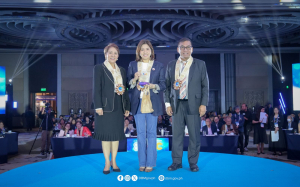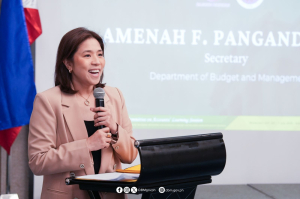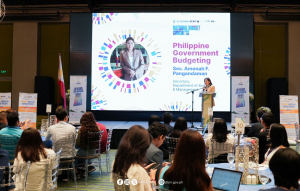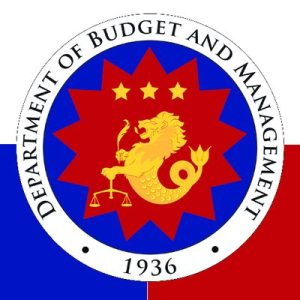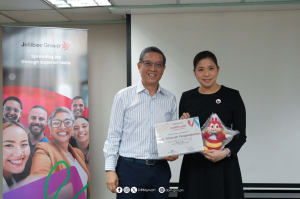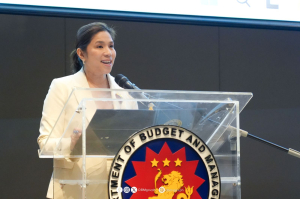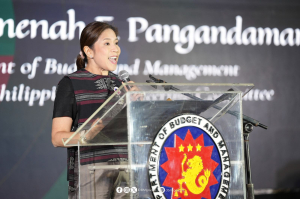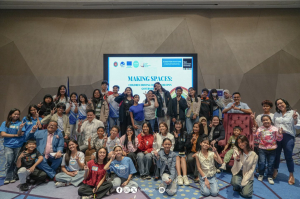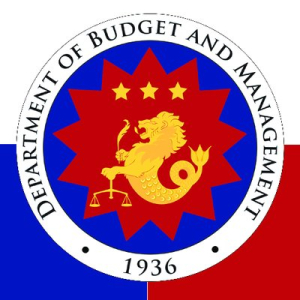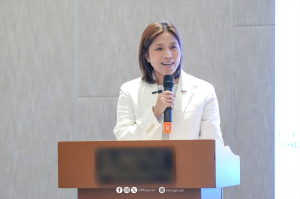
- Details

To Office of the Presidential Adviser on Peace, Reconciliation and Unity (OPAPRU) Secretary Carlito G. Galvez Jr.,
The Women, Peace, and Security (WPS) Center of Excellence Executive Director Susana Guadalupe Marcaida,
Colleagues in the government, members of the Diplomatic Corps, development partners, civil society leaders,
Fellow champions and advocates of the WPS Agenda,
A pleasant evening to everyone, and Happy National Women’s Month!
Assalamu alaikum wa Raḥmatullahi wa Barakatuh
Before anything else, I would like to extend my warmest congratulations to OPAPRU on the successful launch of the Center of Excellence (CoE) on WPS—the first in the Philippines and only second of its kind in Southeast Asia! More importantly, we thank you for working tirelessly to make this dream come true.
This comes at a very opportune time not only because your launch coincides with National Women’s Month but also because this year marks the 25th anniversary of the United Nations Security Council Resolution 1325 and the 30th anniversary of the Beijing Declaration and Platform for Action (1995)—landmark documents for advancing gender equality and promoting the essential role of women in peace processes.
As we commemorate the adoption of these documents, let us reflect on our journey to achieving a truly gender-fair and peaceful world.
Recent studies show that we continue to confront the same challenges, with progress on gender equality and women's involvement in peacebuilding is still limited.
In fact, conflict, instability, and violence are escalating globally, with women and girls bearing the brunt of the impact. They suffer from food insecurity, displacement, and lack of access to education and even healthcare. And even in the absence of armed conflict, women face security threats related to climate change, cybersecurity, digitalization, and geopolitical tensions.
The 2023 Women, Peace, and Security Index—the only index combining inclusion, justice, and security indicators to assess women’s status—reveals significant disparities worldwide. It reports that countries ranking highest are primarily from the Developed Country group, while those considered Fragile States are at the bottom.
Unfortunately, the Philippines ranked 121st out of the 177 countries, scoring 0.61 on a scale of one (1) being the highest.
This is indeed a sad reality. But we must confront this nonetheless. This is why now, more than ever, we are intensifying our efforts to strengthen the WPS Agenda in the country.
As the Budget and Management Secretary—and proudly only the second woman to hold this position and even prouder to be the first Muslim Budget Secretary—upholding “The Women’s Budget” or the Gender and Development (GAD) Budget has always been one of my priorities. Established in 1995, this policy mainstreams gender budget tagging and advocates for gender-responsive budgeting.
We likewise ensure that government-funded programs continue to uplift the lives of all women. This includes supporting women-led small businesses, increasing women’s access to social protection programs, education, and health services, and protecting them through climate finance.
Towards peacebuilding, OPAPRU-led initiatives such as the PAyapa at MAsaganang PamayaNAn (PAMANA) Program have notably improved the lives of the Filipino people through capacity-building, reconstruction, and development in conflict-affected areas. This year, we allocated Php 5.26 billion to support this flagship peace and development convergence program.
And we don’t just stop there. We also create spaces where the WPS Agenda is discussed and prioritized.
Just last year, as you may know, through the OPAPRU, Department of Budget and Management (DBM), Department of Foreign Affairs (DFA), and the Philippine Commission on Women (PCW), the Philippines hosted the first-ever ministerial-level International Conference on WPS, bringing together thousands of stakeholders to further the WPS Agenda on the global stage.
At this conference, the Philippine Open Government Partnership (PH-OGP) also held a side event focusing on strengthening women’s participation in peace processes and economic development.
Now, beyond these events, this Center of Excellence on WPS will ensure that our efforts are sustainable and impactful in the long term. And I am proud that we now have a regional hub where experts and stakeholders can share best practices, forge partnerships, and increase capacity to implement WPS Agenda initiatives at local, national, regional, and even international levels.
As the Chairperson of its Advisory Council, I am actually humbled but I am also confident that the synergy of DBM, OPAPRU, and PCW will continue to push forward the position of our country as a global leader in advancing gender equality and empowering women in peace and security, and consequently, further improve our standing in the WPS Index.
I am sure those who monitor this index will acknowledge that the Philippines is now one of the few countries with this kind of platform. Truly, this historic achievement is a victory for millions of women whose voices, leadership, and contributions to peace efforts will be further recognized, strengthened, and amplified.
Remember, though, that a platform is just a meaningless space if people don’t bring it to life.
So, I call on each one of you, especially our civil society stakeholders, to actively engage, share your expertise, and help transform this space into a true Center of Excellence.
After all, excellence is not just a title—it is forged through shared experiences and the collective resolve to overcome persistent challenges and develop innovative solutions that make a meaningful and lasting impact.
So this Women's Month, as we celebrate women, let us, through this new center, strengthen our resolve to be champions of WPS!
Once again, congratulations! May the Center of Excellence on WPS serve as a true source of inspiration for achieving the Agenda for Women, Peace, and Security in our Bagong Pilipinas.
Thank you very much. Mabuhay ang mga kababaihan!
END

- Details

To my dearest colleagues and fellow public servants here at the Department of Budget and Management (DBM), magandang umaga po sa ating lahat!
Assalamu alaikum wa Rahmatullahi wa Barakatuh.
First, allow me to congratulate our Legal Service, led by our Undersecretary for Legal and Legislative Group, Usec. Janet Abuel and Director Andrea Celene Magtalas, for spearheading this year’s Legal Service Forum on the Fiscal Year 2025 General Appropriations Act’s (GAA) General and Special Provisions.
Now in its fourth year, this LS forum is instrumental in the proper implementation of our National Budget, ensuring the timely, responsive, and efficient use of authorized funds based on existing laws, rules, and regulations.
And there are no better people to lead us in these discussions than our lawyers and legal officers na lagi po tayong ipinagtatanggol, who have dedicated their time and expertise to guiding our department into fulfilling its mandates within the bounds of the Philippine Constitution. So, thank you for your service to the DBM and our nation! Isang malakas na palakpakan!
As you are all aware, our National Budget for FY 2025 has undergone a thorough review to reflect our shared goal of responding to the call of the Filipino people—that “every centavo must go to programs that truly uplift lives, strengthen communities, and secure the future development of the Philippines,” as stated by President Ferdinand R. Marcos Jr. in his Veto Message.
So, as we align our understanding and interpretation of the Special and General Provisions of the FY 2025 GAA and the Veto Message of the President, let the voice of our people inspire us to improve our budget preparation and execution process, upholding the trust vested upon us by our citizens.
Toward this end, we’ve been doing a lot of digitalization efforts here in DBM. First, of course, to enhance efficiency, reduce delays, and eliminate corruption, we have Project TINA, or the Technical Innovations for the National Expenditure Program (NEP) Application. This will automate and make our systems interoperable on budget and management processes.
Last October, we launched the Public Financial Management (PFM) Reforms Roadmap 2024-2028 together with the Asian Development Bank—the country’s comprehensive blueprint for modernizing and harmonizing our PFM systems.
We also launched last year our Budget and Treasury Management System (BTMS). This is an online system where you can see real-time budget obligations and disbursements per agency.
Alongside this, we will soon launch our Project Bumblebee. This e-portal will allow the integration of all digital payments and disbursements among government agencies under one system, establishing a real-time payment and settlement system for government transactions.
In line with this, we will also continue our Public Financial Management Competency Program (PFMCP) to equip our PFM practitioners with the necessary knowledge and skills to manage their authorized resources effectively and efficiently.
Moreover, the passage into law of the New Government Procurement Act (NGPA) or Republic Act No. 12009 will also significantly enhance our budget utilization. As you may know, we have already approved its Implementing Rules and Regulations (IRR) last February.
And so, again, I would like to take this opportunity to extend my deepest gratitude to the Legal Service team for their dedication in crafting both the NGPA and the IRR. They were able to finish it right on time. Napakahaba po ng NGPA, pero natapos po nila ‘yan.
Thank you for being the legal brains behind this law which streamlines and modernizes the procurement process, ensuring greater efficiency and transparency, and ultimately improving the delivery of quality public services to the Filipino people.
Our governance reforms, which aim to address the perennial challenge of underspending, are also our way of fulfilling our commitment to open governance.
As you all know, just last month, we hosted the Open Government Partnership Asia and the Pacific Regional Meeting, attended by over a thousand participants from the entire region who actively exchanged best practices and developed innovative solutions to make governments more transparent, accountable, and participatory around the world.
In that summit, almost every room conducting a side event, breakout session, or plenary discussion echoed a clear message. And let me reiterate that message in today’s session: raise ambitions for our people, forge genuine collaborations, and ensure that our commitments make a real difference in the lives of our citizens.
Hence, let us work together towards a Bagong Pilipinas—a nation where government resources are utilized efficiently, effectively, and legally, within the bounds of the law, and where no Filipino is left behind, all in pursuit of our Agenda for Prosperity.
With that, let us get to work and make this the most productive and impactful Legal Service Forum yet.
Maraming salamat po! Mabuhay po tayong lahat!
END

- Details

To National Economic and Development Authority (NEDA) Secretary Arsenio M. Balisacan,
Office of the Presidential Adviser on Peace, Reconciliation and Unity (OPAPRU) Secretary Carlito G. Galvez Jr.,
Senior officials of National Government Agencies present today,
Fellow public servants, our media partners, and all our stakeholders,
Good afternoon! Assalamu alaikum wa Raḥmatullahi wa Barakatuh.
It is both an honor and a privilege to be part of this significant occasion—the ceremonial signing of a Joint Memorandum Circular that will strengthen the Program Convergence Budgeting (PCB) approach in the budget process. This is a turning point where we are not only aligning our resources, but more importantly, aligning our collective efforts to better serve the Filipino people.
Overview of the PCB Approach
In 2012, the Department of Budget and Management (DBM) has pioneered the PCB approach, an innovative, whole-of-government methodology that fosters collaboration among agencies to implement programs and projects.
The PCB enables government agencies to work together, ensuring consistency in program targets, beneficiaries, focus areas, implementation timelines, and resource requirements, guided by a unified Master Plan or roadmap. It also opens opportunities for partnerships with development groups and the private sector.
Ultimately, the PCB approach strengthens government coordination, ensuring that initiatives are aligned and effectively driving the country’s development goals.
In fact, over the past 12 years, we have successfully implemented several PCB projects, including the biggest inter-agency initiative on disaster response—the Risk Resiliency Program. And in 2023, we digitalized the submission of PCB proposals, aligned with the administration’s thrust to enhance bureaucratic efficiency.
However, we recognize that there is still much more to be done.
Institutionalization of the PCB Approach
That’s why, today, we take a significant step in further solidifying our commitment by institutionalizing the PCB approach through this Joint Memorandum Circular.
We are henceforth establishing the Program Convergence Budgeting Steering Committee (PCB-SC)—chaired by the brilliant NEDA Secretary Arsenio M. Balisacan and co-chaired by yours truly—as the oversight body that will ensure the coordinated and synergized implementation of the PCB programs.
Specifically, the Steering Committee shall identify and approve PCB proposals based on the government’s overarching plan and priorities, and monitor the implementation of existing PCB programs, among others, to further improve the planning-programming-budgeting continuum and compliance of government agencies.
By doing so, we emphasize that the institutionalization of the PCB is not merely procedural, but we seek concrete actions to break down silos, ensure efficient budget allocation, and effectively rationalize overlapping and redundant programs, activities, and projects.
By bringing together programs and initiatives from across different government units, we are creating a unified and cohesive plan to address the needs of our people.
Moving Forward
Looking ahead, we have identified 13 PCB programs for the Proposed FY 2026 National Budget, with several key programs already in motion. Among these are the PCB on Livelihood and Employment, which we started and presented to the President last year, the Water Resources Program, and the PCB on the Sustainable Development Goals, which were initiated during the FY 2025 budget preparation.
With this, let me take this opportunity to express my gratitude to all participating agencies and stakeholders who have worked tirelessly to bring these PCB programs to fruition. Your collaboration and dedication are what make this possible.
But wait, there’s more! Under the Proposed FY 2026 National Budget, we are adding a new PCB project, led by the DBM—the PCB on Philippine Public Financial Management (PFM) Systems! As Budget Secretary, I am deeply committed to ensuring that this initiative lives up to its full potential. Hence, we will continue to work closely with our partners to ensure that all PFM systems and policies are digitalized and harmonized, guided by the Philippine PFM Reforms Roadmap 2023-2028.
Closing
Indeed, today’s signing of this Joint Memorandum Circular marks a milestone in our pursuit of more efficient, transparent, and open governance. Through the PCB approach, we are not just enhancing our ability to fulfill the needs and aspirations of the Filipino people; we are strengthening our resolve to work together as one unified government.
The institutionalization of the PCB approach becomes the cornerstone of our program development and execution. Hence, let us continue to work together, with unwavering commitment, towards our strategic vision for a Bagong Pilipinas marked by unity, progress, and good governance.
Thank you very much.
END

- Details

To my dearest colleagues and fellow public servants here at the Department of Budget and Management (DBM) and our DBM family from our regional offices joining us online, good morning.
Assalamu alaikum wa Rahmatullahi wa Barakatuh.
A few days ago, we received the good news that our budget deficit for 2024 has gone down to 5.7 percent of Gross Domestic Product (GDP) from 6.2 percent in 2023, thanks to our better-than-expected revenue and spending performance. And I am proud to report that the 2024 National Government’s spending reached Php 5.925 trillion or 22.41 percent of GDP! This improved performance is evidence that we are truly on track to achieving our economic targets.
So, allow me to recognize the very hard-working men and women of DBM, especially from the Budget Preparation and Execution (BPE) Group, headed by Usec. Rolando U. Toledo and ASec. Rhea Dela Vega, for contributing to this success!
This is just one result of our increased efforts to optimize our agencies’ budget utilization rates and our commitment to maintaining strong disbursement performance.
Indeed, the DBM is a beacon of integrity, for we fulfill our mandate no matter the circumstances. However, our work does not end with crafting and disbursing the National Budget; that is only one part of the equation. Remember, we are the Department of Budget AND Management, and it is high time we strengthened the management aspect of our mandate.
Hence, we are reintroducing the Enhanced Agency Performance Reviews (EAPR)—a mechanism designed to strengthen accountability, verify goal attainment, and enhance Public Expenditure Management.
The EAPR is our way of reflecting on our purpose and our promises to our citizens. It is asking ourselves: At the end of the day, did we really use our public funds to improve the life of every Filipino? While this question is answerable by yes or no, arriving at the real answer is more complex than that.
To help us navigate this significant task, we have issued Circular Letter No. 2025-2, outlining the guidelines for conducting the AEPR for 2024 and beyond. This incorporates key findings from Focus Group Discussions on the effectiveness and challenges of the previous review process.
And I am proud to share that several recommendations have already been integrated into the EAPR. Notably, some of the most critical additions are anchored in the core principles of effective management: empowerment, collaboration, strategic direction, and motivation.
We have introduced the Self-Assessed Financial and Physical Performance (SAFPP) Tool, which enables agencies to independently identify bottlenecks in program implementation and develop catch-up plans to address them. By empowering agencies with this tool, we hope to promote a sense of accountability and encourage proactive problem-solving within their teams.
But this does not mean they have to do this alone. We will continue to support them through Performance Dialogues. Through this collaborative process, we can achieve more effective program execution and improved public service delivery.
Next, the adoption of the Agency Performance Reviews or the APR Scorecard will facilitate a more objective and standardized evaluation of performance across departments and agencies. It will also provide a clear strategic direction, ensuring that goals are aligned, progress is measured consistently, and data-driven insights guide improvements.
Finally, we know that the EAPR process can be demanding, but we undertake it because we understand its importance in upholding good governance. These efforts will not go unnoticed, as we will continue implementing our Annual Recognition System to motivate the top-performing institutions. Through this, we are not only rewarding hard work but also fostering a culture of excellence and continuous improvement.
These are just some of the enhancements to our APR starting this year, and I am excited for you to learn more about the other salient features of the Circular Letter with our expert colleagues from the BPE Group.
We hope to be able to use the APR not just to assess agencies but to truly improve performance for the nation to sooner meet its “A” credit rating and ultimately achieve our goal of being an upper-middle-income nation with single-digit poverty levels.
As we gear up for the Agency Performance Reviews, may this forum serve as a valuable platform for us to actively participate, share meaningful insights, and appreciate the dedication behind every milestone of every department and agency that have sworn to serve the people.
Let us keep in mind that our goal is not just to rate their outputs but also celebrate achievements, identify gaps, and inspire them to renew their commitment to Bagong Pilipinas—where every peso is spent to genuinely uplift the lives of the Filipino people.
Maraming salamat po! Mabuhay ang BPEG at DBM! Mabuhay ang mga ahensya at kawani ng gobyerno! Mabuhay ang Bagong Pilipinas!
Wabillahi Tawfiq Wal Hidaya, Wasalamu alaikum wa rahmatullahi wa Barakatuhu.
END

- Details

To Ambassador Celia Anna “Cookie” Feria;
Heads and Representatives of Department of Foreign Affairs, Government Procurement Policy Board, Office of the Deputy Executive Secretary for Finance and Administration, Office of the Deputy Executive Secretary for Support Services, Department of Trade and Industry, Department of Social Welfare and Development, Tourism Promotions Board, Procurement Service – DBM, and Office of the Director-General for Operations;
My esteemed colleagues;
A pleasant afternoon to all of us. Welcome to DBM!
Assalamu alaikum wa Raḥmatullahi wa Barakatuh.
First, allow me to thank you for attending our first Committee Meeting in preparation for the Association of Southeast Asian Nations (ASEAN) Summit in 2026. Your presence here today speaks volumes of your commitment to accelerating economic, social, and cultural development across the ASEAN and promoting peace and stability within the region and beyond.
The Philippines as chair of the ASEAN Summit will emphasize our role as a founding member of one of the most successful inter-governmental organizations in the world, for which we must step up to the challenge of being a leader among nations.
Last March 2024, the President issued Administrative Order No. 17, institutionalizing the creation of a National Organizing Council (NOC) for this high-level gathering. We have our work cut out for us—to organize, manage, supervise, and fund all major and ancillary programs, activities, and projects related to the country’s hosting of ASEAN 2026.
As we know, the ASEAN Summit is the highest policy-making body of the bloc, comprising the Heads of State or Government of Member States. The biannual ASEAN Summit Meetings will provide a platform to deliberate and decide on important matters of interest to the association and our region in general.
Taking the helm of such a significant event is no small feat. In fact, Executive Secretary Lucas P. Bersamin even described the preparations for it as a "gargantuan task." But the Philippines has consistently proven that no challenge is too great when we come together, bound by a shared vision and purpose.
I am happy to share the example of our recent hosting of the 2025 Open Government Partnership (OGP) Asia and the Pacific Regional Meeting just two weeks ago. We are grateful for the opportunity to lead the conference to advance our agenda of promoting transparent, participatory, inclusive, and accountable governance in the Asia-Pacific and beyond.
We successfully engaged almost 800 delegates, conducted around 60 sessions comprising side events, plenaries, and breakouts, and mobilized over 60 organizations to pull off the most dynamic, fruitful, and memorable OGP Regional Summit!
At this summit, our New Government Procurement Act (NGPA), signed into law by PBBM, was also recognized as a prime example of game-changing reforms in the region, highlighting our steadfast commitment to good governance.
Its most salient features include open contracting, beneficial ownership information declaration, digitalization, inclusive procurement, and participatory processes. And just last Monday, February 10, we published the NGPA’s Implementing Rules and Regulations (IRR), ensuring that this law is not only passed but truly implemented.
I mention this to emphasize that for ASEAN 2026, you can leverage the law’s key features to fulfill our mandate effectively: ensuring budget approval and timely release, addressing procurement requirements for all activities, and coordinating with all committees to meet their financial needs. And you might want to hold one side meeting on Open Government Partnership.
The road ahead is demanding, but we have the vision, the resources, and the collective resolve to make ASEAN 2026 a resounding success.
Let us ensure that every peso serves its purpose, every procurement process is transparent, and every decision upholds the highest standards of integrity and accountability as we ensure that ASEAN 2026 will be the best and most memorable ASEAN Summit ever.
May this meeting be both productive and instrumental to achieving our goals. I call on each of you to bring your expertise, dedication, and leadership to the table as we work together to strengthen our international relations and enhance regional cooperation.
Maraming salamat po, and now let’s all get to work!
Wabillahi Tawfiq Wal Hidaya, Wasalamu alaikum wa rahmatullahi wa Barakatuhu.
END
